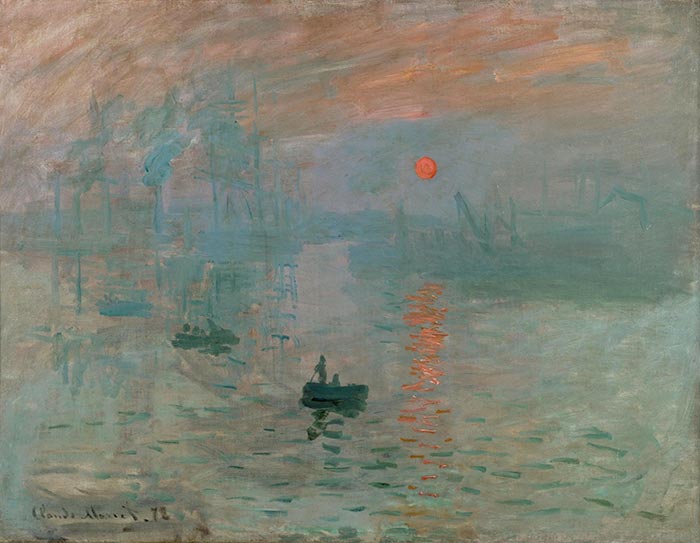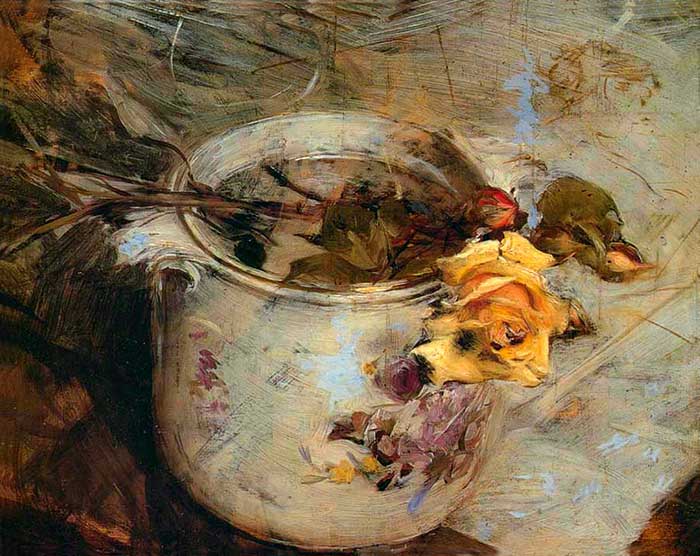What Is the Principle of Art That Uses Contrast to Draw Attention to an Area?
What is Emphasis in Art?
Emphasis is a principle of art which refers to the utilise of visual elements to draw attention to a certain area, normally a focal point, in an artwork.
In that location are many ways yous could go about using emphasis in your art. Usually, it involves contrasting different elements against each other. For example, a bright, red object will stand out amongst a dull greyness background. Or a straight line amongst curved lines. Or a round object amongst round objects.
What Should You Emphasize?
Earlier yous effort to use emphasis in your art, you need to ask yourselfwhat am I going to emphasize? It would exist counter-productive to describe attention to unimportant areas in your painting.
Consider what your focal point is and what y'all are trying to communicate through your painting. What is your big idea?
Take the painting below past John Singer Sargent for example. The focus of the painting is clearly the Parisian beggar girl. Notice how Sargent used emphasis for the daughter'southward extended hand; hard edges and that burst of ruby effectually her forearm draw your attention towards this area. Her confront, on the other hand, is left vague and ambiguous. This works in favor of Sargent's big thought for the painting—her begging hand is more important than her identity.

John Singer Sargent, A Parisian Ragamuffin Girl, 1877

Master Painting Examples of Emphasis in Fine art
Below are some more examples of emphasis in fine art, starting with Impression, Sunrise by Claude Monet. Your attention is drawn towards the vivid orange sunset, which stands out from the weak blues, greens, and grays in the background. Monet used colour saturation in this case to emphasize the dusk.

Claude Monet, Impression, Sunrise, 1872
(If y'all want to learn more about landscape painting, make sure to grab my complimentary Landscape Painting Starter Kit).
In the painting below, Giovanni Boldini used thick paint and saturated colour to emphasize the flowers in the vase. Notice how the background is nix but a thin stain of colour.

Giovanni Boldini, The Rose in Vase of Sassonia
InResearch by Joaquín Sorolla, the area on the tabular array is emphasized past several elements:
- The light which is illuminating the desk and research area;
- The implied lines created by the men looking downward at the tabular array (we want to look where they are looking);
- The relatively bright colors used for whatever is in the bottles; and
- The lightest low-cal, being the white shirt of the researcher sitting downwards.

Joaquín Sorolla, Inquiry, 1897
In Valentin Serov'south painting below, the woman looking out over the bounding main breaks upwardly the tapered line created by the crashing shore. This interruption of the line makes a powerful statement and emphasizes the position of the woman.

Valentin Serov, Iphigenia in Tauris, 1893
In George Inness' moody tonalist painting, the sunset over the sea is emphasized past the increased color saturation and the warm colors.

George Inness, Dusk over the Bounding main, 1887
Calorie-free is obviously the primary source of emphasis in the painting below, with nigh of the painting being in shadow and only a few areas being illuminated past the lamp.

Edgar Degas, Interior, 1868-1869
In Monet's high-key landscape, Poppies, the foreground is emphasized past the presence of the figures and the relatively vibrant red poppies, which stand out against the surrounding greens and blues.

Claude Monet, Poppies, 1873
In Berthe Morisot's painting beneath, the two figures are emphasized by their strong position in the painting effectually the center. There is too a stark contrast between the deep black of the adult female and the white apparel of the child.

Berthe Morisot, A Adult female with a Baby on the Balcony, 1872
Desire to Learn More?
If you want to learn more most this topic, you lot should cheque out my mail service on the other principles of art.
You might be interested in my Painting University course. I become into more detail on composition and how to apply it finer in painting.
Cheers for Reading!
Thank you for taking the time to read this postal service. I capeesh it! Feel costless to share with friends. If you want more than painting tips, check out my Painting University class.
Happy painting!

Dan Scott
Depict Paint Academy
Source: https://drawpaintacademy.com/emphasis/
0 Response to "What Is the Principle of Art That Uses Contrast to Draw Attention to an Area?"
Post a Comment